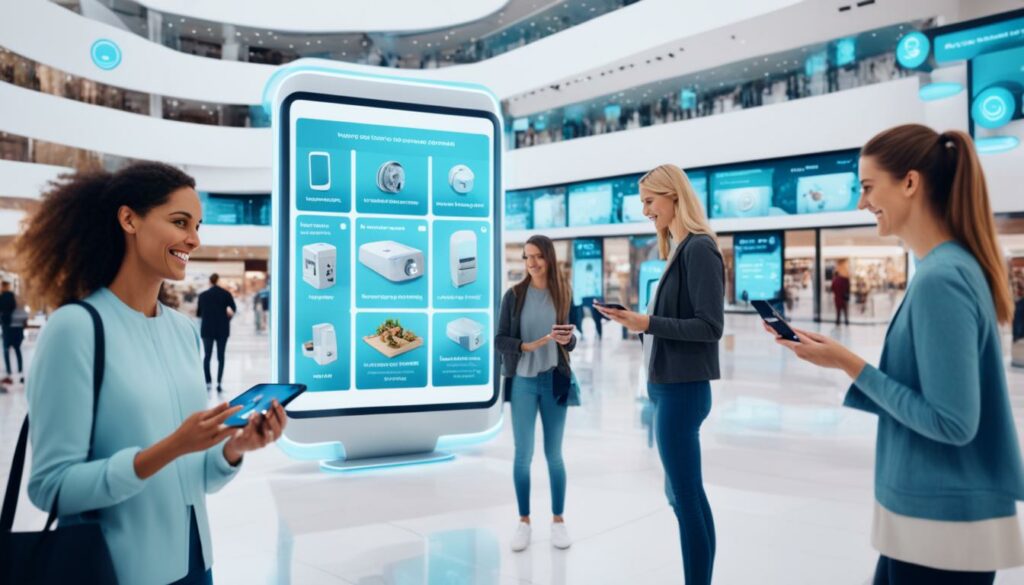Did you know the global recommendation engine market hit $2.3 billion in 2020? It’s expected to grow by 29.3% each year until 2028. This shows how vital AI-powered recommendation engines are for online sales today. They make shopping better and help businesses sell more by offering personalized advice.
AI algorithms study what customers like and suggest products they might enjoy. This has led to a 5-15% increase in sales, as shown by research from McKinsey & Company. Big names like Amazon, which gets 35% of its income from its recommendations, are investing a lot in this tech.
With 91% of shoppers preferring brands that offer deals and experiences just for them, it’s key for companies to use AI for recommendations. This tech is crucial for staying ahead and boosting sales. Let’s explore how these systems work and their benefits for growing sales.
Key Takeaways
- The global recommendation engine market is projected to reach significant growth, approximately doubling in size by 2028.
- AI-powered recommendation systems can enhance sales by 5-15% through tailored suggestions.
- 35% of Amazon’s revenue comes from its highly effective recommendation engine.
- 91% of consumers favor brands that provide personalized recommendations and relevant deals.
- AI offers critical insights that improve businesses’ understanding of customer needs.
Understanding AI-Powered Recommendation Engines
AI-powered recommendation engines are key in today’s digital world. They look at user data to give personalized tips, making the customer experience better. These systems use smart algorithms to guess what users might like and make their online interactions better.
Definition and Functionality
Recommendation engines use complex algorithms to understand user behavior. They offer personalized tips based on what users like. There are different types of these systems:
- Collaborative filtering: This method looks at what similar users like to suggest items.
- Content-based filtering: This focuses on the features of items to match them with user preferences.
- Knowledge-based systems: These systems use user knowledge to give recommendations, not just past behavior.
- Hybrid systems: These combine different methods to make recommendations more accurate.
More businesses are making decisions based on data, so knowing how these engines work is key. They help manage complex tasks, especially in B2B settings. Here, they help with knowledge management and make workflows more efficient.
Importance of Personalization in Sales
Personalization boosts customer engagement and sales. Customized experiences build loyalty, leading to more repeat purchases and higher satisfaction. Online stores use recommendation engines to make shopping more personal, which improves the customer’s journey and increases sales.
Studies show that personalized tips can really boost sales. Users are more likely to interact with content that matches their interests.
The Technology Behind Recommendation Engines
Understanding how recommendation engines work is key to using them well. At their heart are machine learning algorithms. These algorithms look at a lot of data to find patterns in what users like. This helps make suggestions that fit what each person likes.
How Machine Learning Algorithms Work
There are different types of machine learning algorithms, each with its own benefits. Collaborative filtering looks at what other users like to predict what you might like. It can be based on memory or models, making it more accurate. Content-based filtering suggests items that are similar to what you’ve liked before.
Both have their strengths but also have limits, especially for new users or items. Hybrid filtering combines these methods for better suggestions. This way, it meets a wider range of user needs.
Role of Predictive Analytics in Recommendations
Predictive analytics makes recommendation engines better by predicting what customers will like. This leads to a more personalized experience, as seen with AI-driven insights. These insights can increase order rates by up to 150% and improve site conversion by 13%.
Such systems help grow sales and reduce bounce rates by up to 24%. Companies like Amazon and Netflix use predictive analytics to make their platforms better. This shows how important it is for e-commerce and content platforms.
Benefits of Implementing AI-Powered Recommendation Engines
Using AI-powered recommendation engines in business brings big wins. It boosts conversion rates and makes customers happier. These systems give personalized tips, helping shoppers find what they need easily. This leads to more sales and happier customers.
Increased Conversion Rates
One big plus of AI benefits is a big jump in conversion rates. A study found 52 percent of shoppers want offers that fit their needs. Retailers use AI to meet this demand, turning lookers into buyers. For example, Manssion saw a 18.65% rise in order value with AI-powered content filtering.
Enhanced Customer Experience
AI-driven recommendation engines make shopping better. They look at what you’ve bought and what you’ve looked at before. This makes suggestions that you’ll like. Being open about how data is used builds trust, as most customers want to know.
Hybrid systems, like Netflix’s, get about 80% of user activity. This shows how good AI can really engage users.
| Statistic | Impact |
|---|---|
| 52% of shoppers want personalized offers | Increases shopper engagement and conversions |
| 18.65% boost in Average Order Value by Manssion | Indicates effectiveness of content-based filtering |
| 79% of customers want transparency | Builds trust through clarity in data usage |
| 80% of Netflix activity from hybrid systems | Showcases the power of effective recommendations |
| CAGR of 33% for recommendation engine market | Reflects growing importance in e-commerce |
How Recommendation Engines Drive Sales Growth
AI-powered recommendation engines are key to boosting sales by helping customers find new products and encouraging them to buy again. They look at lots of data to give personalized tips that match what customers like. This leads to happier customers and more sales.
Customized Product Discoveries
These engines are great at giving product tips that fit what users want. They use info on what people have bought before, what they look at online, and other details to make smart suggestions. Big online stores like Amazon use this to sell more stuff, making customers buy more things. This way, they make more money because 74% of shoppers get upset if stores don’t try to know what they like.
Boosting Repeat Purchases
Smart recommendations also help customers come back to buy again. When people see products they like, they’re more likely to visit the site again. In fact, 56% of shoppers say they go back to sites that give them good product tips. This makes more money for businesses over time, as sales go up by 40% with these personalized tips. The engines keep an eye on what users like, so they always offer the right suggestions, keeping customers happy and coming back.
| Metric | Percentage |
|---|---|
| Increase in Revenue with Personalized Recommendations | 40% |
| Customers Likely to Return with Recommendations | 56% |
| Customers Frustrated with Lack of Personalization | 74% |
Integrating Recommendation Engines into Your Business
Adding AI-powered recommendation engines to a business needs careful planning and strategy. First, companies must set clear implementation goals that match their overall business plans. Having specific goals helps guide the integration smoothly.
Setting Goals for Implementation
When setting implementation goals, it’s important to know what the business wants from the new engines. Goals might include boosting sales, improving customer interaction, or making the user experience better. Clear goals help measure the success of the integration and let companies tweak their plans as needed.
Data Collection and Cleaning Strategies
Getting and cleaning data right is key to making machine learning work. Businesses should collect data from many places, like customer interactions and purchase history. Then, they must clean and organize this data to make sure it’s accurate and reliable. This step is crucial because it affects how well the recommendation engines work.
The goal is to use the right data to make the recommendation system better. As companies move forward, having clear goals and good data strategies will help them get the most out of AI-powered recommendation engines.
Real-World Examples of Successful Implementation
AI-powered recommendation engines have made a big impact in retail and entertainment. Companies like Amazon and Netflix show how these systems change the game. They use technology to make customers happier and more engaged.
Case Study: Amazon’s Recommendation System
Amazon uses a smart recommendation system. It looks at what users buy, their history, and what they like. This helps Amazon suggest products that fit what each customer wants.
- Results in enhanced customer satisfaction and loyalty.
- Facilitates operational efficiency through AI chatbots and predictive maintenance.
- Boosts sales through targeted marketing strategies.
Amazon shows how AI can help grow sales and make things run smoother. Successful stories like this prove the value of smart data use.
Case Study: Netflix Content Suggestions
Netflix uses AI to make watching TV more fun. It looks at what users watch and rate. This has led to a 20% jump in how much people watch.
- Enhances user retention and loyalty.
- Creates personalized viewing experiences, keeping subscribers engaged.
- Combines continuous algorithm improvement for precise recommendations.
Netflix shows how AI can keep customers coming back and increase revenue. Their success is a great example of how AI can boost a brand and improve customer interaction.

AI-Powered Recommendation Engines in E-Commerce
AI-powered recommendation engines have changed how we shop online. They use a lot of data to suggest products that match what customers like. This makes shopping more personal and helps stores sell more.
AI looks at how customers act to predict what they might buy next. For example, if a customer looks at certain products, the AI suggests five more like them. This keeps customers interested and might lead to more sales.
Most shoppers want stores to know what they like and suggest products that fit their tastes. Personalized tips can make people spend more and come back to a site. In fact, many shoppers say they’ll visit a site more often if it gives them product tips. This helps stores keep customers coming back and sell more.
AI does more than just suggest products. It helps with many tasks and changes based on what customers do. This helps stores set prices smartly and stay competitive. For more on how AI can help your online store, check out AI marketing strategies.
These systems keep getting better as they learn from customers. This means they stay relevant and help stores grow in the competitive online market.
| Statistic | Insight |
|---|---|
| 76% | Shoppers expect tailored online experiences. |
| 56% | Online shoppers are more likely to return if recommendations are made. |
| 5 items | Recommended based on previous user interactions. |
| Dynamic recommendations | Adapt in real-time based on customer interactions. |
| Continuous learning | Helps provide current insights on shopper preferences. |
Diverse Applications Across Industries
AI-powered recommendation engines are becoming more popular in many sectors. They solve unique business challenges with tailored solutions. In retail, these engines make shopping more personal by offering products based on what customers like.
This approach boosts sales and makes customers happier. It uses data on what customers buy and like to suggest products they might enjoy.
E-Commerce and Retail
AI is key in the retail world. It helps by:
- Making shopping more personal with customer data.
- Adjusting prices based on current market trends.
- Improving stock management to match what customers want.
- Using AI chatbots for quick customer help, making things better for users.
Media and Entertainment
In media, recommendation engines change how we watch and listen. Services like Spotify and YouTube use them to:
- Offer content that fits what users like.
- Use data to make playlists and recommendations.
- Keep users coming back by guessing what they’ll like next.
These examples show how AI-driven recommendation systems help different industries grow and innovate.
Challenges in Utilizing Recommendation Engines
AI-powered recommendation engines bring both benefits and challenges for businesses. They aim to improve customer experiences while keeping data safe and ethical. Finding the right balance between personalizing offers and respecting user privacy is key.
Data Privacy Concerns
Using customer data to make better recommendations raises big privacy issues. Companies must follow laws like GDPR and CCPA. Collecting lots of data can make users lose trust. It’s important to have strong security and be open about how data is used.
Handling data ethically is crucial for keeping customers happy and building trust. This means being careful with how data is used and respected.
Potential for Over-Personalization
Personalized recommendations can make shopping better, but too much can be a problem. Users might feel like they’re being watched, which can make them uncomfortable. Companies need to find a sweet spot that keeps users interested without being too invasive.
This means knowing what users like but also thinking about what’s right. It’s about making offers that are diverse and don’t push users away.

| Challenge | Description | Potential Solutions |
|---|---|---|
| Data Privacy | Ensuring user data is collected and handled according to regulations | Implement strong security measures, use anonymization techniques |
| Over-Personalization | Risk of alienating users through excessive targeting | Focus on diverse recommendations, balance user engagement strategies |
| Data Quality | Maintaining relevant and accurate data for effective recommendations | Regularly update data feeds and cleanse databases |
| Scalability | Challenges associated with processing large datasets | Utilize distributed computing frameworks for efficiency |
Future Trends in Recommendation Systems
Recommendation systems are changing fast, thanks to new tech and users wanting more personalized experiences. Companies are using deep learning to make these systems better. They aim to keep users interested and coming back for more with new ideas.
The Role of Deep Learning
Deep learning is key to making recommendation engines smarter. It lets algorithms look at lots of data to understand what users like. Big names like Netflix and Facebook use deep learning to make recommendations that really hit the mark.
Netflix’s system looks at what users like and what’s popular, making sure they get the right suggestions. Facebook uses deep learning too, making sure users see the right friends and news in their feed. This shows how deep learning is changing how we get personalized recommendations.
Cross-Platform Recommendations
With more devices and platforms, users want recommendations that work everywhere. Companies like Tecton are making systems that work well across different places, meeting various business needs. This means users get the same great experience no matter where they are.
Systems like Uber’s surge pricing use real-time machine learning to give users the best options right away. This focus on working across platforms is key for businesses to make the most of their recommendation systems in today’s connected world.
Measuring the Success of Your Recommendation Engine
AI-powered recommendation engines need regular checks to see how well they work. By looking at key metrics, businesses can improve how users engage and boost sales.
Key Performance Indicators to Track
Key performance indicators (KPIs) are vital for checking how well a recommendation engine does. Important metrics to watch include:
- Click-through rates: Shows how users interact with the recommendations.
- Adoption and conversion rates: Sees how many users buy something after seeing a recommendation.
- User engagement: Tracks how often users look at the recommendations.
- Sales impact: Looks at revenue made from recommended products.
eBay’s CEO said about 35% of their sales come from recommendations. This shows why tracking performance well is important.
Feedback Loops and Continuous Improvement
Feedback loops are key for making things better. By listening to what users say, we can make recommendations better and meet what customers want. Techniques like:
- Content-based filtering
- Collaborative filtering
- Hybrid systems combining both methods
Help make recommendations more personal. For example, Google’s YouTube says about 60% of clicks on the home screen come from personalized suggestions. This shows how good recommendations can work.
In short, using the right metrics and feedback loops helps improve things over time. This leads to a better experience for users and more sales.
| Metric | Description | Usage Importance |
|---|---|---|
| Click-Through Rate | Percentage of users interacting with recommendations. | Essential for determining engagement level. |
| Conversion Rate | Rate at which recommendations lead to purchases. | Key for understanding sales impact from recommendations. |
| User Feedback | Direct user responses to recommended products. | Crucial for refining the recommendation process. |
| Sales Impact | Revenue generated from recommended products. | Core for measuring financial success. |
To keep doing well, businesses should use these methods and keep making changes based on what they learn from users and feedback.
Conclusion
AI-powered recommendation engines bring big benefits for businesses wanting to boost sales and improve customer experience. These systems give personalized advice and use data to build stronger customer ties. They help companies understand what customers like and how they shop, leading to more sales and staying ahead in the market.
Recommendation engines are used in many fields like online shopping, media, and banking. As they become more common in business, the future of AI in sales looks bright. Companies that use these technologies can offer better, more tailored products and services to their customers.
But, there are challenges like privacy issues and the danger of giving too much personal info. Businesses need to be careful when using these engines. By using a mix of different recommendation methods and always improving, companies can make the most of these engines. This way, they can handle the complex world of AI in sales.
FAQ
What are AI-powered recommendation engines?
AI-powered recommendation engines use machine learning to analyze what users like. They provide personalized suggestions to improve customer experience and boost sales in many industries.
How do recommendation engines improve sales?
These engines use data to offer product suggestions that match what customers want. This leads to more customer interaction, higher sales, and customer loyalty. Customers are more likely to buy again.
What technologies are utilized by recommendation engines?
They use machine learning and predictive analytics to look through big data. This helps them find patterns and suggest products that fit what users like.
What are the benefits of implementing AI-powered recommendation engines?
These systems increase sales by offering targeted product suggestions. They make shopping easier and more enjoyable for customers. This leads to more repeat business.
Can you provide examples of companies that successfully use recommendation engines?
Amazon and Netflix are great examples. Amazon suggests products based on what users buy. Netflix keeps subscribers happy by offering content they like.
What challenges do businesses face when using recommendation engines?
Companies face issues with data privacy and the risk of too much personal info. It’s key to balance personalization with ethics and follow the law to keep customers trusting them.
What future trends are anticipated in recommendation systems?
The future looks bright with deep learning making these systems smarter. We’ll also see recommendations that work across different devices and platforms.
How can companies measure the effectiveness of their recommendation engines?
Keep an eye on important metrics like sales, how engaged users are, and how often they come back. Use feedback to make your suggestions better and keep them in line with what customers want.




